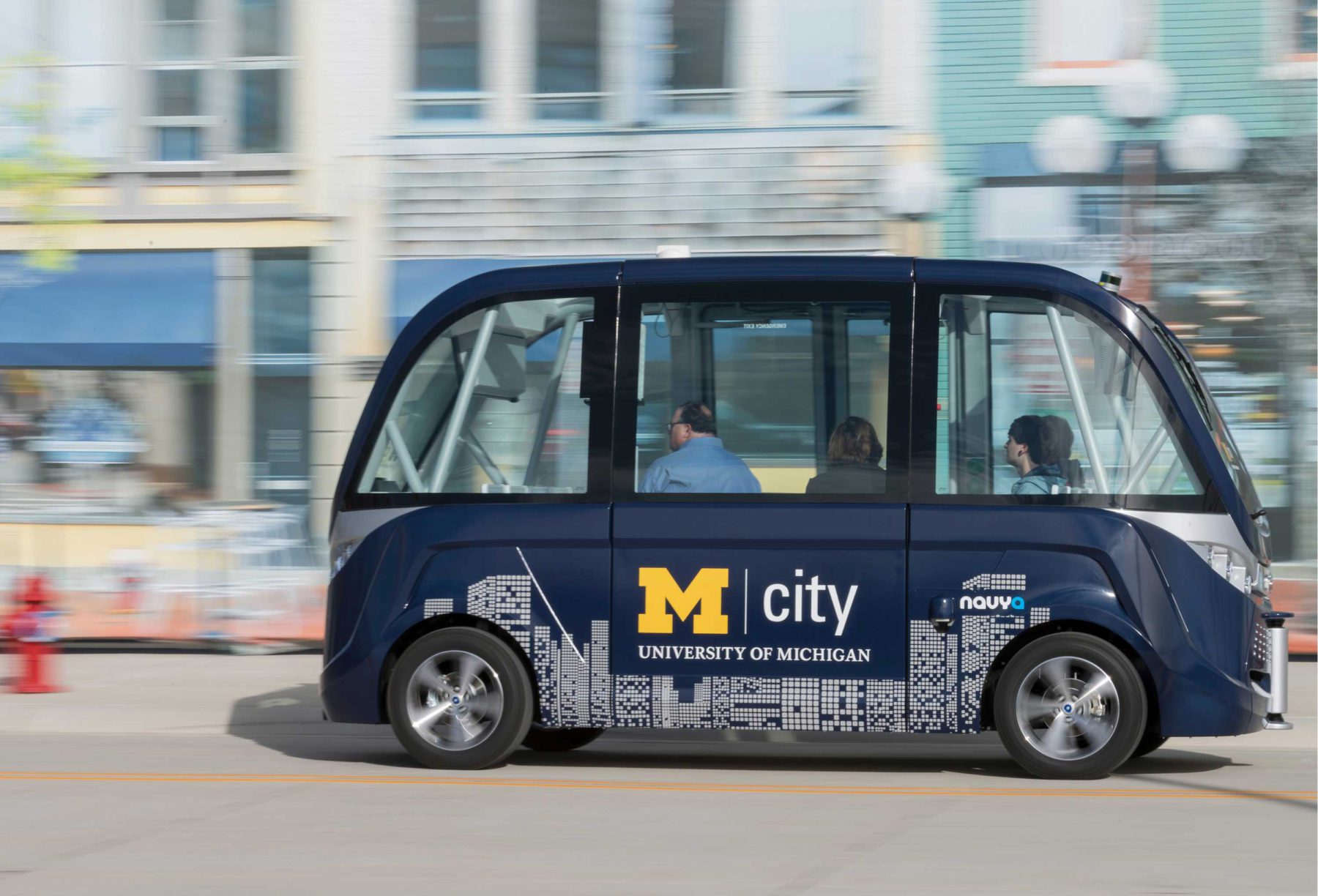Driverless shuttle introduced at Mcity

A fully autonomous, 15-passenger electric shuttle manufactured by French firm NAVYA will support research and provide self-guided tours of Mcity, U-M’s one-of-a-kind test site for connected and automated vehicles.
U-M and NAVYA announced the collaboration today.
This is the first of NAVYA’s ARMA vehicles to operate in North America. The shuttles are already on the road in countries all over the world. They’re designed for use at a broad range of sites that need efficient, convenient, and safe first and last mile transportation—places such as theme parks and large campus-like environments.
“The ARMA at Mcity supports the university’s interrelated missions of research and education,” said S. Jack Hu, U-M vice president for research. “It also underscores the importance of international collaboration as we work with companies from around the world to help society realize the substantial benefits in safety and sustainability promised by connected and automated vehicles.”
NAVYA is bringing the ARMA to U-M and will become an affiliate member of the Mobility Transformation Center, a public-private partnership dedicated to leading the auto industry into a future of connected and automated mobility. The center operates Mcity.
The shuttle will provide fully automated, self-guided tours of Mcity, and support research, initially through TechLab at Mcity, the university’s incubator for mobility startups. The collaboration will give students a chance to work with the ARMA. MTC and NAVYA will also explore potential joint research opportunities.
Using the ARMA for automated, self-guided tours at Mcity will help to educate visitors about the potential of autonomous vehicle technology, said MTC Deputy Director Carrie Morton.
As a research platform, the ARMA offers an opportunity to study how automated vehicles could help people connect to mass transit easily, Morton said. Researchers may also study new ways for driverless vehicles to perceive the world around them, which is key to their safe operation. In addition, there are many critical research questions still to be answered about consumers and automated vehicles. How do they engage with self-driving cars? Do they accept the technology? Are they comfortable with it?
“We’re excited that the ARMA at Mcity is the first in North America,” Morton said. “By showcasing the ARMA’s capabilities completely driving itself in Mcity, we can help open the imagination of others to the potential of autonomous vehicle technology.”
NAVYA CEO Christophe Sapet said that while NAVYA has successfully deployed the ARMA all over the world, the first ARMA in North America is a milestone because the region represents one of the largest future markets for driverless vehicles.
“This is a landmark day for NAVYA,” Sapet said. “Mcity is a great partner and Michigan the perfect place to deploy the first NAVYA ARMA. We expect our expansion in North America to be broad and decisive in the coming months.”
In January, NAVYA will join TechLab, which is managed by Michigan Engineering’s Center for Entrepreneurship and MTC. TechLab is an experiential incubator that matches early-stage technology companies with engineering students interested in applying classroom learning to practical tech development––a model of applied learning that will be a key driver for innovation. Through TechLab, U-M undergraduate students will gain hands-on experience working with the ARMA to develop new machine vision capabilities, for example.
“We are excited to have NAVYA as a partner in the upcoming semester of TechLab,” said TechLab at Mcity Instructor Jay Ellis. “It is becoming more apparent that the collaboration between university researchers, advanced mobility startups and student innovators, is key in pushing the boundaries of autonomous and connected vehicle technologies and bringing these innovations closer to market.”
The NAVYA ARMA is the latest addition to Mcity’s vehicle resources. Last month, MTC said it will provide new research vehicles as open testbeds that will allow academic and industry researchers to rapidly test a wide range of self-driving and connected vehicle technologies. The first open connected and automated research vehicle, or Open CAV, is a Lincoln MKZ that is already in use. In coming months, MTC will add two more testbeds based on the Kia Soul. The Open CAVs are available to U-M faculty and students and faculty, startups and possibly other MTC industry partners.